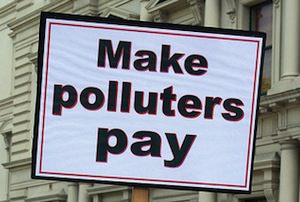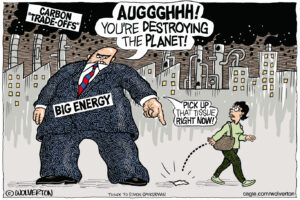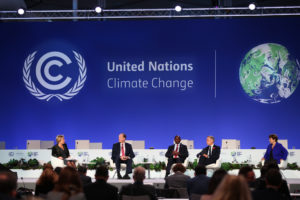Carbon Market Looks a Little Livelier
Many U.S. companies are adopting their own carbon pricing systems, while in Europe there's a hint of new life for efforts to persuade industry to switch to low-carbon technologies.
By Kieran Cooke, Climate News NetworkThis piece first appeared at Climate News Network.
LONDON — Don’t put any bets on it – but at long last the world-wide trade in carbon looks set to improve, if only just a little.
In mid-December the European Union adopted an emergency law designed to firm up prices in its Emissions Trading System (ETS). Many people see carbon trading as a key weapon in the battle against climate change, though others say it has so far been ineffective in tackling the problem.
The ETS, the world’s biggest carbon trading scheme, seeks to reduce CO2 emissions by requiring companies such as energy suppliers and oil and gas conglomerates to pay for their pollution.
But the ETS, which has been operating since 2005, has underperformed. Market analysts say carbon allowances or so-called “pollution permits” need to be traded at a price of at least €25 in order to reflect the true cost of emissions and persuade companies to decarbonise.
Recently allowances, based on the market price of a tonne of carbon, have been trading at around the €4.50 mark. At one stage earlier in 2013, prices dropped to under €3.
Mishandling of the market led to a chronic over-supply of tradeable allowances. Europe’s economic crisis also lessened economic activity and reduced the demand for allowances.
Comprehensive reform
The EU’s new law postpones the sale of 900 million ETS carbon allowances: the move, referred to as “backloading”, aims to lift prices from levels which the EU admits are too low to encourage companies to invest in low-carbon technologies. It came after 18 months of political wrangling between member states, with some saying the ETS market should be allowed to find its own price levels, without intervention by Brussels.
Various non-governmental organisations, while welcoming the change as a step in the right direction, say the measure – which is only temporary – is only “a patch-up solution”.
They say at least 2.2 billion allowances need to be permanently removed from the ETS by 2020 if decarbonisation goals are to be met. In mid-January 2014 the EU is scheduled to announce proposals for a comprehensive structural reform of the ETS.
Meanwhile a report by the Carbon Disclosure Project (CDP) indicates that other moves are under way which could breathe new life into the moribund carbon market.
Less reluctant
The CDP, investigating the carbon policies of a number of large companies in the US, says many firms are setting their own internal carbon pricing as “a core element in their ongoing business strategies”.
For some companies internal carbon pricing is aimed at being ready for future environmental legislation. Internal carbon pricing is also used to assess the value of projects and calculate the risk of various investment decisions.
Some of these companies might have previously been reluctant to become involved in carbon pricing or discussions of climate change.
“Such carbon pricing has become standard operating practice in business planning, in that companies acknowledge the process of ongoing climate change – including extreme and unpredictable weather events – as a key relevant business factor for which they wish to be prepared”, the report says.
Interestingly, internal pricing set by the US companies is often considerably higher than that in the ETS. Exxon Mobil, in setting its own carbon market, anticipates a price of US$60 by 2030. BP and Shell at present use a price of US$40.
At the other end of the scale, Google uses a price of US$14, while the Walt Disney organisation, which has set itself the long-term goal of “zero net greenhouse gas emissions”, uses prices of between US$10 and US$20.
Your support matters…Independent journalism is under threat and overshadowed by heavily funded mainstream media.
You can help level the playing field. Become a member.
Your tax-deductible contribution keeps us digging beneath the headlines to give you thought-provoking, investigative reporting and analysis that unearths what's really happening- without compromise.
Give today to support our courageous, independent journalists.






You need to be a supporter to comment.
There are currently no responses to this article.
Be the first to respond.